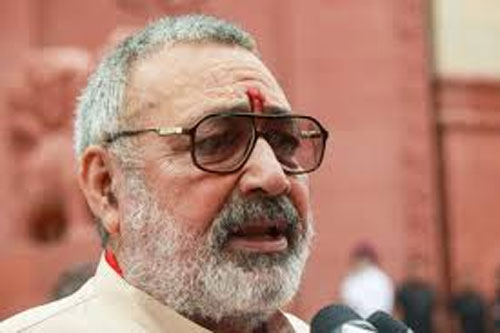Daijiworld Media Network - New Delhi
New Delhi, Sep 7: Union Minister Giriraj Singh launched a sharp critique against Congress leader Rahul Gandhi, holding him responsible for what he described as a pattern of political actions that breed disrespect and instability across the country — from Bihar to Kashmir.
His comments followed a recent incident in Srinagar, where an inauguration plaque featuring the Ashoka Emblem at the Hazratbal Shrine was vandalised during renovation work led by the Jammu & Kashmir Waqf Board.
In an interaction with IANS, Singh declared, “If this country starts functioning under Rahul Gandhi’s leadership, it will collapse.” Linking the vandalism to previous controversies, Singh didn’t hold back in his criticism:

“I want to ask Rahul Gandhi, Tejashwi Yadav, and Lalu Yadav – how many times will you let Bihar be humiliated? You brought Stalin to abuse Bihar, Revanth Reddy to insult its DNA, and now, this disgrace in Kashmir — what message are you sending?”
Referring to the Ashoka Emblem, Singh underscored its national and constitutional relevance:
“This isn’t just a symbol of Emperor Ashoka from Bihar — it represents the very soul of the Constitution and the unity of the nation.”
The act of vandalism at such a sensitive religious location has ignited widespread condemnation across political and public spheres. Authorities have registered a case at Nigeen Police Station under relevant provisions of the Bharatiya Nyaya Sanhita, and an investigation is ongoing to identify the perpetrators.
Singh also used the occasion to renew his attack on Gandhi’s international conduct, saying:
“Rahul Gandhi travels abroad only to belittle India. In contrast, Prime Minister Narendra Modi has worked tirelessly to uplift the poor and strengthen the middle class. He has brought 27 crore people out of poverty. By simplifying GST, he ensured that poor families could celebrate festivals like Durga Puja and Diwali with dignity. That is his vision – one of inclusive celebration and empowerment.”
The incident has added fuel to ongoing political confrontations, with Singh painting Gandhi’s leadership as a threat to both national dignity and unity, tying isolated incidents into a broader narrative of alleged disrespect toward India’s institutions and culture.